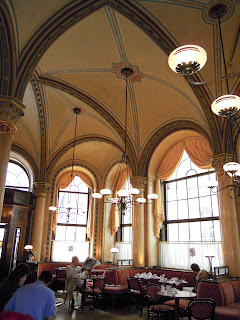Other places have clubs or pubs, trattorias, bars, bistros; Vienna has coffee houses. The rules are simple: find a seat, order a cup of coffee, grab a newspaper, then another one, talk to a friend, spend the day - without placing another order. The server will let you be. He might replace the glass of water that comes with the coffee with a fresh one every once in a while, but he will not bug you. When you decide to leave and ask for the check he might take his time, showing you that he couldn't care less. It's a game, it takes practice.
Vienna's coffee houses are the L.A. antithesis: they are slow and they have no regard for those who seek to produce themselves.
Pictures: seating area and newspaper rack at Café Zentral
Vienna's coffee houses are the L.A. antithesis: they are slow and they have no regard for those who seek to produce themselves.
Pictures: seating area and newspaper rack at Café Zentral


Comments
I am the Content and Community Manager of Travelavenue.com, the new community travel guide.
I am very happy to tell you that our editorial team has selected your blog to be a part of our program “Travelavenue favorite blog 2010”.
How can I contact you? I would like to present you our program.
See you soon on Travelavenue,
Laure
lh@travelavenue.com
www.travelavenue.com